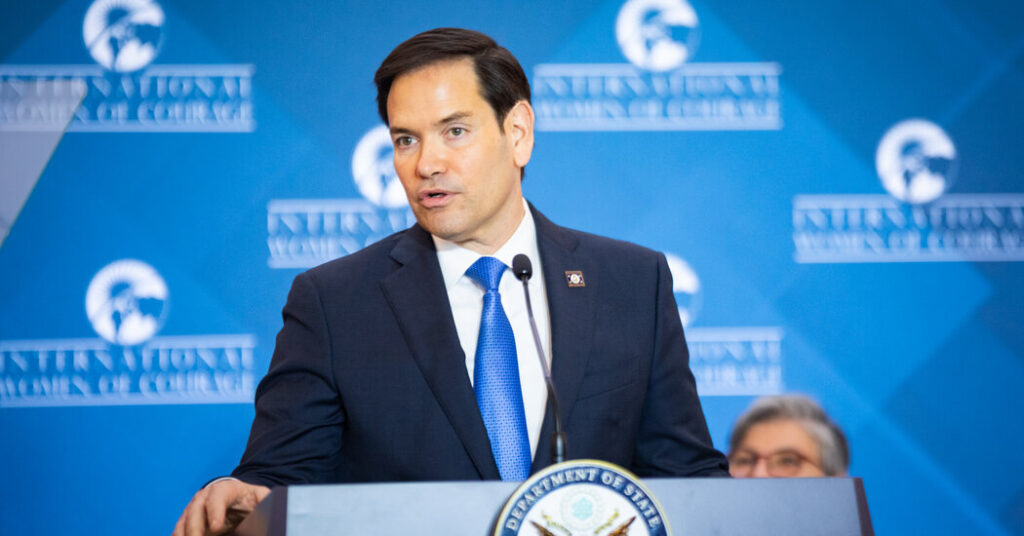Secretary of State Marco Rubio traveled to Brussels on Thursday for a gathering of NATO foreign ministers amid high anxiety over the Trump administration’s approach to Europe, including the war in Ukraine, relations with Russia and President Trump’s growing trade war with the continent.
Mr. Rubio’s visit to the alliance’s headquarters, the first by a senior Trump administration official this year, comes as relations between the United States and Europe have abruptly shifted from the close cooperation of the Biden era to mistrust and acrimony under Mr. Trump.
At the same time, NATO officials may welcome a chance to confer with Mr. Rubio, whom many consider the most pro-alliance member of Mr. Trump’s national security team.
As a senator in 2023, representing Florida, Mr. Rubio cosponsored legislation requiring any president to seek the Senate’s advice and consent before withdrawing from the organization. Former aides say Mr. Trump has privately mused about taking that step, which would shatter the 32-nation military alliance formed to counter Russia.
Foreign officials who have dealt with Mr. Rubio since he became Mr. Trump’s top diplomat have described him as downplaying some of Mr. Trump’s wilder ideas and translating them into more realistic policy approaches, although they also question whether he truly speaks for a president with whom he does not have a close personal relationship.
And there is only so much Mr. Rubio can do to sugarcoat Mr. Trump’s agenda, which is driven by a view that Europe economically exploits the United States, is culturally out of sync with the values of Mr. Trump’s political movement and must do business with Russia’s president, Vladimir V. Putin.
Mr. Rubio also arrives just a day after Mr. Trump announced 20 percent tariffs on imports from the European Union. At the White House on Wednesday, Mr. Trump said of the E.U.: “They rip us off. It’s so sad to see. It’s so pathetic.”
In meetings with NATO ministers, Mr. Rubio is expected to press Mr. Trump’s call for a swift end to the war in Ukraine, an approach that alarms many European leaders who overwhelmingly support Kyiv and fear that Mr. Trump will wind up appeasing Mr. Putin.
Mr. Rubio’s fellow ministers will do their best to shape the Trump administration’s efforts to broker a deal between Kyiv and Moscow, which have stalled over wide gaps between the warring parties, and to urge the United States not to abandon Ukraine.
Mr. Rubio is also likely to reiterate Mr. Trump’s demand that NATO countries increase their military spending to 5 percent of their gross domestic product, even as many of them struggle to meet spending goals of 2 percent that the alliance set years ago. Mr. Trump and other top American officials believe that the alliance relies too heavily on the United States for protection.
That was made painfully clear to European officials by a discussion among top Trump administration officials last month on the Signal app that unwittingly included a journalist, Jeffrey Goldberg of The Atlantic magazine. During the text chain, about a U.S. plan to bomb Houthi militants in Yemen, Vice President JD Vance complained that America would “again” be “bailing out” Europe by taking unilateral action to protect international shipping lanes that the Houthis have attacked.
“I fully share your loathing of European freeloading,” Defense Secretary Pete Hegseth responded. “It’s PATHETIC.”
Mr. Trump himself has warned that he may not come to the defense of NATO countries that he feels are not spending enough on their militaries, despite the alliance’s commitment to mutual self-defense. “If they don’t pay, I’m not going to defend them,” the president told reporters last month.
An additional point of tension is Mr. Trump’s determination to acquire the island of Greenland, which is an autonomous territory of Denmark, a NATO member. Mr. Trump has shocked officials from Denmark and other NATO countries by declining to rule out taking Greenland by force, although Mr. Vance said on a recent visit to the island that military action was not under consideration.
Denmark’s foreign minister will attend the gathering in Brussels, although it is unclear whether he and Mr. Rubio will discuss Greenland. Danish officials say they cannot negotiate Greenland’s fate on their own because the island has the right of self-determination.
Mr. Rubio will be joined in Brussels by the new U.S. ambassador to NATO, Matthew G. Whitaker, whom the Senate narrowly confirmed on Tuesday.
NATO officials are unsure what to make of Mr. Whitaker, who briefly served as acting attorney general during Mr. Trump’s first term but has no foreign policy experience. During his confirmation hearing, Mr. Whitaker assured senators that the United States’ commitment to NATO was “ironclad.”
https://www.nytimes.com/2025/04/03/us/politics/rubio-visits-nato.html


